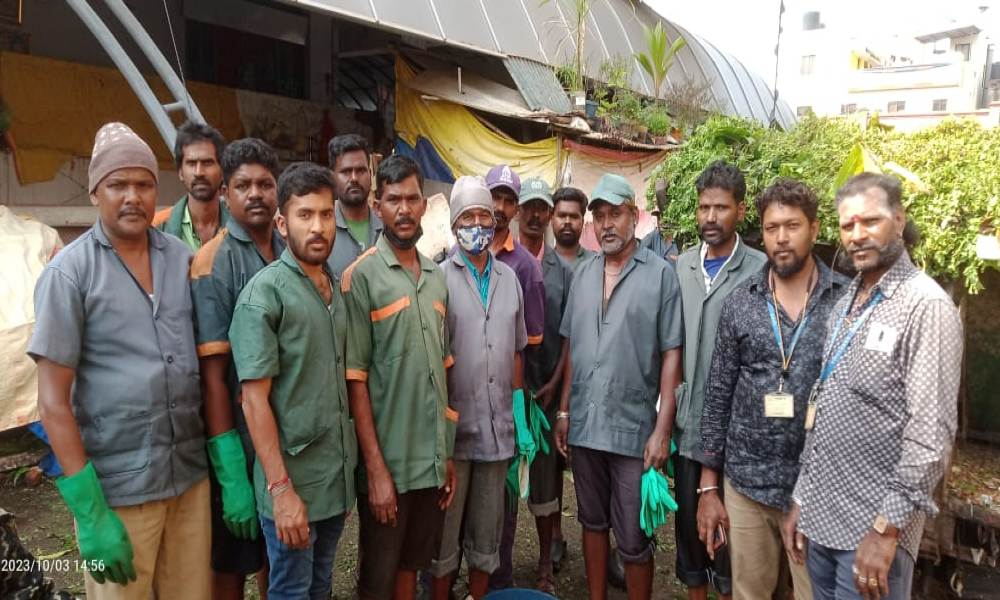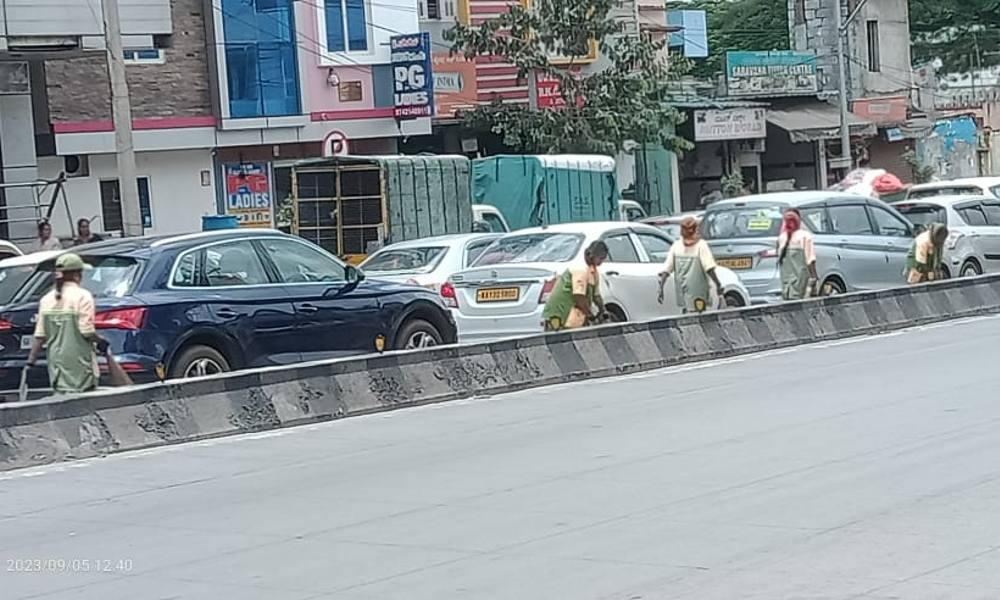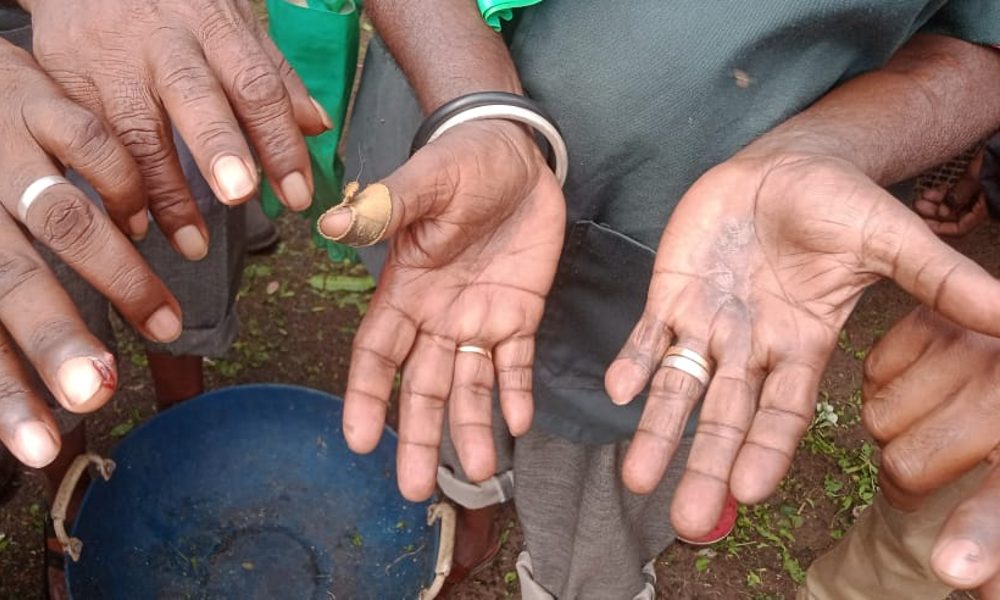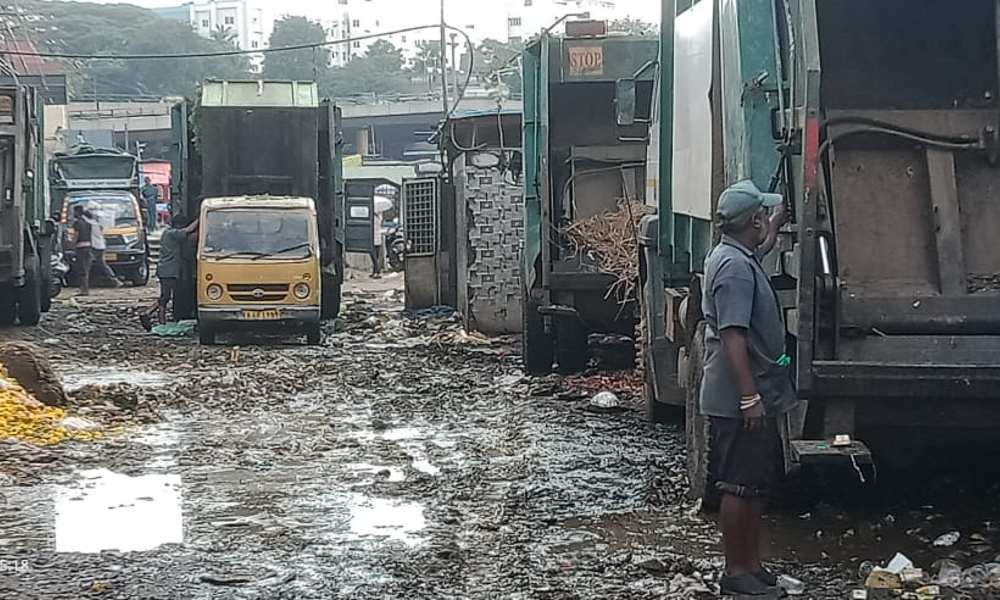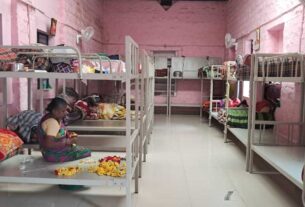The pourakarmikas or sanitation workers in Bangalore say they need adequate safety equipment. Bruhat Bengaluru Mahanagara Palike (BBMP) joint commissioner (Solid Waste Management) said they provide enough equipment.
Pourakarmikas working under the BBMP contractors complain of not receiving safety gloves, masks and boots. While some Pourakarmikas work without them, others are forced to buy them with their own money. Many of them usehave also been using the same equipment for a long time, even if they are now worn out and ineffective.
According to the official BBMP Solid Waste Management website, there are more than 1700 Pourakarmikas (out of a total 18,500) “under the direct payment of ULB” (Urban Local Body). Pratibha R, Joint Commissioner, Solid Waste Management, BBMP explained that these workers receive their salaries directly from the BBMP fund. She added that the rest, or around 17,000 Pourakarmikas will be brought under the direct payment system soon and are currently working under contractors.
Rajathi and Vasanth are pourakarmikas under the BBMP East Zone, responsible for sweeping the streets in Russel Market, Shivajinagar. They said that they have not received gloves or masks for over six months. Rajathi said, “We keep demanding gloves and masks from our contractor, but it is of no use.” Vasanth said that he had recently bought a mask with his own money because the dust from the street causes him to sneeze repeatedly.
Padma is a pourakarmika working in the BBMP Head Office near Hudson Circle. She said that she had contracted allergies on her palm from handling water and liquid waste without gloves. She complained that even though she is given gloves twice or thrice in a one a year, the quality is poor and they tear easily, which causes her to go without them most of the time.
Pourakarmikas responsible for collecting and segregating waste at KR Market, BBMP West Zone face the same problem. M. Saravana is a BBMP West Zone supervisor responsible for supervising garbage segregation and collection. He said, “The pourakarmikas working under my supervision do not receive any safety equipment from the contractor. Gloves, masks and boots are all bought by them out of their own pockets, because they can’t possibly handle waste without them.” He said that more often than not, the garbage the workers deal with contain sharp, pointy objects such as metal or plastic scrap or thorns, which is why gloves are necessary. “Leaving diseases aside, workers buy masks to prevent some of the stench from going in.” Mr. Saravana said.
Prabhu, a Pourakarmika, who has been working under a contractor for almost ten years now, said that his monthly salary is a fixed Rs. 12,000 which is not sufficient to pay off bills. “In addition, we buy our own masks, gloves and boots with our own money, the cost of which is only rising.”
Santosh, another Pourakarmika said pointing at his injured finger, “I got this cut this on my finger while picking up garbage earlier. I didn’t realize there was something sharp inside the pile.” He added that injuries such as these are very common among the workers.
Out of the 12 Pourakarmikas under M. Saravana’s supervision, only four were wearing boots. Others walked on wet garbage and mud in their plain shoes as they loaded the garbage truck.
R. Ranganath is the BBMP contractor under whom Prabhu and Santosh are employed. He said that he will soon provide the workers working under him with the required equipment, and that he does receive enough funds from the BBMP.
However, BBMP officials say that the Pourakarmikas do get adequate safety equipment. Pratibha R, Joint Commissioner, Solid Waste Management said, “Each year we call for tenders for sufficient equipment to be distributed to around 18,500 Pourakarmikas who work under our jurisdiction. They are provided with sufficient safety equipment.” However, she added that the workers at times choose to not to wear the masks because they feel uncomfortable.
Under Article 42 and 43 of the Indian Constitution (Directive Principles of State Policy), it is recognized as the duty of the State to secure just and humane conditions of work and conditions of work ensuring a decent standard of life.
Dr. Anirudh Gaurang Gudlavalleti is a senior research associate at the Indian Institute of Public Health, Hyderabad. He said that sanitation workers come across variety of hazards every day, like human waste, biomedical waste, sharp objects, respiratory irritants, chemicals, and biological agents. “They are hence at a higher risk of developing infectious diseases like gastroenteritis, hepatitis A, typhoid fever, cholera, leptospirosis and tetanus. Musculoskeletal problems like back pain, shoulder pain, neck pain and respiratory problems like asthma, bronchitis, Chronic Obstructive Pulmonary Disease (COPD) may also arise.” He further said that the workers can also contract skin problems like eczema, dermatitis and mental health problems like stress, anxiety, depression, and Post-Traumatic Stress Disorder (PTSD).
“It is thus imperative that employers ensure measures like provision of protective gear, implementation of safe work practices and periodic monitoring of the health of the workers to protect them from all potential health hazards,” he added.


